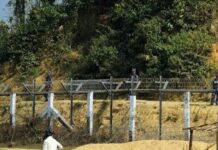Remote control bombs used in attacks on police
 Remote control bombs were used in four of the five recent attacks on police, according to police officials.
Remote control bombs were used in four of the five recent attacks on police, according to police officials.
Similar bombs were used in the attack on police on Saturday night, the officials think. Each incident was carried out in a similar style and timing. The same explosives were also used.
Analysing the targets, timing, spots and style of attacks, officials related to the investigation said certain quarters inspired by militant organisations are carrying out such attacks.
An influential minister in the government also said these attacks may be a test case of big attacks.
Security analysts and several sources involved in anti-militancy activities said Jamaat-ul-Mujahideen Bangladesh (JMB), a new militant organisation which follows IS, was cornered due to continuous anti-militancy drives by the law enforcing agencies following the Holy Artisan attack in Gulshan.
Many of them were either killed or arrested. Three years into the incident, the militant organisation has become active again. This militant organisation was freshly inspired after IS had carried out a deadly attack in Sri Lanka on 21 April. Within seven days, JMB blasted bombs targeting police in Dhaka.
International militant organisation IS claimed the responsibility as it had claimed credit after the attacks on Holy Artisan and previous attacks. The law enforcing agencies rejected the claims of IS, but did not reject that militant organisations are involved in the attacks.
Investigators said a team or cell of the new JMB might be involved in this attack. Officials concerned uncomfortable as the incidents are taking place one after another and they have failed to find those behind the attacks.
An emergency meeting was held at the police headquarters on Monday afternoon to discuss the progress of the investigation of these incidents and determine the next course of action. Additional deputy inspector (intelligence) Haidar Ali Khan presented information on the incidents. Police have been asked to continue their efforts o to tackle militancy. High officials of different law enforcing agencies were present at the meeting.
Active again, targeting police
In April, in the Telegraph app of pro-IS, militants in Bangladesh were asked to carry out lone wolf attacks, targeting the members of law enforcing agencies.
Law enforcers across the country were alerted about the possible lone wolf on Key Point Installations (KPI) in mid June.
A video with threats of militant attacks was published in the first week of last month.
Serial attacks on police in the capital began on 29 April. The latest incident took place at the Science Lab intersection on Saturday night.
Out of five incidents, five policemen, a community police member, a rickshaw puller and a woman were injured in blasts in three attacks. The bomb blasts took place at Gulistan, Malibagh, Science Lab intersection between 7:30pm and 9:15pm. Two bombs were recovered from the busy areas of Paltan intersection and Khamarbari. It is not know when the two bombs were placed at the spots, but the bombs were recovered after 10:00pm.
 Commissioner of Dhaka Metropolitan Police (DMP), Asaduzzaman Mia, in a briefing on Sunday said remote control bombs were used in the incidents of Gulistan and Malibagh.
Commissioner of Dhaka Metropolitan Police (DMP), Asaduzzaman Mia, in a briefing on Sunday said remote control bombs were used in the incidents of Gulistan and Malibagh.
On condition of anonymity, DMP Counter Terrorism and Transnational Crime (CTTC) unit officials said they found the evidence of remote control devices in the bombs recovered from Paltan and Khamarbari. They are examining whether the bombs used in the latest attacks on police at Science Lab intersection are remote control or not.
CTTC bomb disposal team deputy commissioner Sanwar Hossain said crude explosives were used in these five incidents.
Examining the bombs, it seems that those who made these bombs were not expert and not capable to ensuring powerful explosions.
Sanwar Hossain said these five incidents are quite different than those militant attacks carried out at different places across the country. But these five incidents are almost similar.
He thinks those carrying out these attacks are very ‘weak, isolated and small’.
About the bomb blast at Science Lab intersection, Awami League general secretary and road transport and bridges minister Obaidul Quader said this incident may be a test case of big incident.
Speaking to newspersons on Sunday, he said the attack was carried out on police. It cannot be said that ministers and MPs will not come under such attacks in the future.
He said there is no reason to think that the militants have been weakened although they have not been totally inactive.
Obaidul Quader also said the government is aware, prepared and investigations are on to find this group.
CTTC unit at DMP is investigating four incidents of attacks on police. This unit investigates the incidents which may have link with militancy. A decision has been taken to transfer the Saturday’s incident at Science Lab intersection to CCTC unit, said New Market police station officer-in-charge Atiqur Rahman. He said footage of surrounding areas were collected, but nothing was found.
Wishing not to be named, a CTTC official said that they thought the militants, who were able to make Improvised Explosive Devices (IED), were killed during the anti militancy drives or they are in jail.
The official said they are reconsidering the matter after the blasts of remote control bomb blasts. The blast of less powerful bombs may be a test case.
Who are involved?
High officials in police said ‘terrorist groups’ are carrying out the attacks to destablise the country. Same statements were given in the First Information Reports (FIRs) in the cases in connection with the incidents. It was suspected that militants were involved in these incidents.
After the incident of Saturday night, the officials are not willing to say militants are involved.
CTTC chief and additional police commissioner Monirul Islam told newspersons at his office on Monday that the members of Jamaat-Shibir were carrying out the attacks against police in the name of new JMB. He said the JMB is a militant organisation comprised of former leaders and activists of Jamaat-Shibir. He said law enforcers are trying to identify these types of people and arrest them.
Monirul Islam also said the Jamaat-Shibir wanted to create anarchy when the trial of war crimes began politically. At that time, they considered police as the main opponent. Police resisted them so that they could not create anarchy. Police enforced law in the interest of public security, lives and state properties. This went against them. In view of that, they have anger against police.
While briefing newsmen on the arrest of five JMB men on 9 August, Monirul Islam said among the five, Shibli Shahazad Istadi collected some equipment to make IEDs. There was a type of gas can in the IEDs recovered from Khamarbari and Paltan areas. Shibli collected four such cans. These five suspected militants were involved in that incident.
Home minister Asaduzzaman has said, “I have ordered investigations into the matter. We have never said we have eliminated militancy completely. We are aware of it.”
Concern
People who work on militancy said JMB revealed their existence by blasting bombs simultaneously in 63 districts across the country on 17 August 2005. A few years before the incident, they carried out small incidents at different places. The law enforcing agencies did not take the incidents seriously. Before the Holey Artisan incident of 1 July 2016, the militants carried out repeated operations aimed at killing.
About the recent incidents, Bangladesh Institute of Peace and Security Studies (BIPSS) chairman retired major general Muniruzzaman said the attacks on police indicated that militant organisations were trying to reemerge freshly.
“It is a matter of grave concern. Militant activities are emerging on the scene and these may increase. There must not be ignored.”
*This report, originally published in Prothom Alo print edition, has been rewritten in English by Rabiul Islam.









